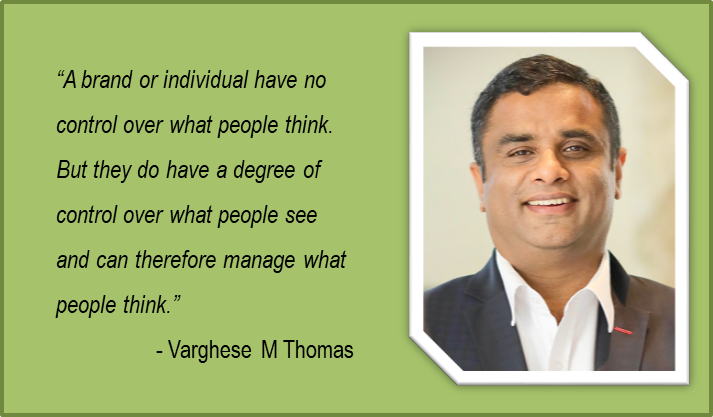Varghese M Thomas, Vice President – Corporate Communication & Global Head, TVS Motor speaks to Sameera Fernandes about the greatest communication challenge for leaders today and actionable leadership advice.
Why do you feel companies/brands need to make reputation management a priority?
Typically, a company or a brand takes years, often decades, to build a reputation. Today, it takes one tweet to destroy it. Take the case of CrossFit founder and CEO Greg Glassman’s two-word tweet, posted about a year ago, about George Floyd. Glassman, who founded the branded fitness regime in 2000, had to resign as his tweet drew a massive backlash. At the risk of sounding like doomsday prophets, every brand and every business today are at risk for reputation damage. Tech-savvy antagonists know how to create and distribute false information. All it takes is a single fake-but-compromising Photoshopped image, a fake review on Google, or a spam comment etc., and you are facing a crisis that could destroy your brand.
Reputation management is more necessary today than it has been in the history of humankind. Brand or individual indeed has no control over what people think. But they do have a degree of control over what people see and can therefore manage what people think. A business needs no longer to use physical presence to build its reputation (or destroy it). Over the last two decades, reputation management has moved to the fast-moving world of online interactions – and therefore needs to be prioritised.
Financial management experts commonly recognise reputation as an intangible asset. We are seeing the value of reputation increase with the COVID-19 pandemic. Studies investigating the pandemic’s economic effect have shown that intangible asset value that used to command 68% of the S&P500 market value in 1995 increased to 90% in 2020. There can be no stronger argument to make reputation management a priority.
Everyone has to practice crisis leadership today. What are your thoughts?
The world appears to be stumbling from one crisis to another, giving everyone sleepless nights. We are living in increasingly faster cycles of political, economic, social, military and environmental emergencies. Preparing for, preventing, countering and coping with their impact on business has become everyone’s responsibility.
Fake news, rumour, an upset customer, the inability to meet regulatory norms, anything can trigger a business crisis. The result can be instantaneous with lost opportunities, legal costs, financial penalties and can threaten the values on which a business is built. Ideally, we all need to learn to manage a crisis by assessing how it impacts our roles and seeking professional help. Managing a crisis requires situational awareness, business wisdom and nerves of steel. It requires the tools to communicate rapidly and accurately. I’d say that every business needs to have a well-oiled crisis management team it can quickly reach out to when necessary.
What is the greatest communication challenge for leaders?
Today’s complex business environment requires leaders to be highly responsive. They don’t have the luxury of time to put every piece of data and information in place before deciding. They have to think on their feet. Sometimes, this means making decisions based on partial and incomplete data. They should therefore be ready to keep evolving their communication as additional data becomes available. This effect, they have to tread a fine line, so they don’t lose their credibility in the quest for timeliness. The secondary challenge is using different communication channels to reach various stakeholders and strengthen the core messaging rapidly. Acquiring a deep understanding of these channels is a challenge.
Why do leaders need to be effective communicators?
We all need to be effective communicators (and listeners!). This is not the responsibility of leaders alone. But leaders need to be effective communicators more than others. Great leaders can confidently connect with people using their communication and listening skills. Effective communication is the key to building common organisational goals, buying people into a collective vision, motivating them, creating an atmosphere of understanding, and navigating them through difficult times. Leaders who communicate effectively also have a more loyal following. I also feel that aside from being effective communicators, leaders ought to share critical information with employees and pay attention to feedback. This fosters trust. If employees don’t trust a leader, the communication loses potency, and it becomes ineffective.
How do you continue to grow and develop as a leader?
That is a question with many exciting answers. An entire semester in business school may not be enough to explore all the answers. But here are the top qualities that help leaders grow: vision, strategic thinking, empathy, humility, communication and listening skills and in today’s world, a propensity to use data and analytics for decision-making.
No leadership training and development program can afford to skip a working knowledge of data and analytics and, of late, the ability to use artificial intelligence to support decision-making. The role of digital in creating value and dealing with disruption is growing. Gaining expertise in using digital technologies is a sure path to continued growth as a leader.
What is the one actionable leadership advice you wish to share?
Leaders must embrace diversity, focus on inclusivity and become champions of sustainability. Leaders have a more significant responsibility to the societies they serve, and they must carry out those responsibilities with diligence and honesty. Today’s businesses operate in a globalised, multi-cultural environment. To make real progress, their leaders should deliver lasting value through open cultures and environmental stewardship. Leadership is not about being in charge; Leadership is about taking care of those in your charge.
The views and opinions published here belong to the interviewer and the interviewee and do not necessarily reflect the views and opinions of the publisher.



Be the first to comment on "Straight Talk with Varghese M Thomas"